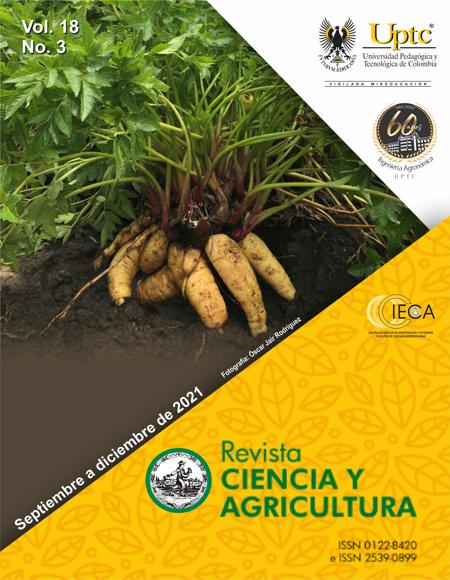Environmental sustainability and waste management in cocoa production systems in the southwest of Boyacá-Colombia

Abstract
The objective of this research was to know what the concept of sustainability is and how the management of agricultural residues (phytosanitary, fertilizers, biomass and inert residues) is carried out within cocoa production units in the southwest of the department of Boyacá. For this purpose, a descriptive, non-probabilistic research was carried out, applying a survey-type instrument to 52 cocoa production units in the municipalities of Miraflores, Santamaría, and Campohermoso; units belonging to 3 cocoa associations. The data revealed that there is a conception of sustainability linked to the concept of neoliberal economic growth, where environmental sustainability is not the priority, as if it is the increase in profits. On the other hand, the management of the water resource is not adequate, there is no drinking water and there is no treatment of the wastewater, which does not have any purification process before being returned to the water tributaries. Additionally, people live and work in the same workplace. Regarding the management of agricultural residues, it is evidenced that there is no knowledge or application of Good Agricultural Practices, this means that phytosanitary products and fertilizers are applied without technical supervision, the management criterion being the experience of the producer.
Keywords
Theobroma cacao, GAP, Agricultural production, Sustainable development
References
- Arrarte, R. A. (2005). ¿Maximización de utilidades o incremento del valor del accionista? Quipukamayoc, 12(24), 41-43. https://doi.org/10.15381/quipu.v12i24.5438 DOI: https://doi.org/10.15381/quipu.v12i24.5438
- Bravo, M., & Bravo, S. (2016). La economía ambiental y ecológica relacionada con el desarrollo económico. Revista DELOS: Desarrollo Local Sostenible, 25. http://www.eumed.net/rev/delos/25/economia.html
- Congreso de la República de Colombia. (1991). Constitución Política de Colombia. http://www.secretariasenado.gov.co/senado/basedoc/constitucion_politica_1991_pr007.html#219
- Coronado, R., & Valencia, R. A. (2015). Gestión Integral de Residuos Agrícolas para la Generación de Materias Primas en el Municipio de Cota Cundinamarca [Universidad Distrital Francisco José de Caldas]. https://repository.udistrital.edu.co/bitstream/handle/11349/3001/CoronadoGutierrezRaul2015.pdf?sequence=1&isAllowed=y
- Coy, J. (2018). Evaluación multifuncional de explotaciones agrícolas de tipo familiar y/o campesina en el municipio de Útica, Cundinamarca [Universidad de la Salle]. https://ciencia.lasalle.edu.co/cgi/viewcontent.cgi?article=1543&context=economia
- De Juan, R., & Mochón, A. (2006). Principios de Economía. Libro de Problemas (Tercera Edición). McGraw-Hill Interamericana de España, S.A.U.
- Delegatarios a la Asamblea Nacional Constituyente. (1991). Constitución Política de Colombia del 13 de junio de 1991. [Legal]. SUIN-Juriscol. http://www.suin-juriscol.gov.co/viewDocument.asp?ruta=Constitucion/1687988
- FAO. (2002). Agricultura mundial: Hacia los años 2015/2030 (Primera). FAO. http://www.fao.org/3/y3557s/y3557s00.htm#TopOfPage
- Gil Alejandro, León Andrés, Aguirre Carlos, Suárez Darliston, Martínez Helí, Bautista Hernando, Urrego Jhorman, Puerta Jorge, Gavanzo Jorge, Valenzuela Juan, Calderón Luis, López Mauricio, Hincapié Oscar, Hernández Pablo, & Restrepo Tatiana. (2019). Buenas prácticas agrícolas en el cultivo, beneficio y comercialización de cacao (Theobroma cacao L.) (Tercera edición). Compañía Nacional de Chocolates S.A.S. https://repository.agrosavia.co/bitstream/handle/20.500.12324/35708/35708.pdf?sequence=1&isAllowed=y
- Hernández, R., & Mendoza, C. P. (2018). Metodología de la investigación: Las rutas cuantitativa, cualitativa y mixta. McGraw-Hill Interamericana de editores, S.A. de C.V.
- Labandeira, X., León, C., & Vázquez, M. X. (2007). Economía ambiental. Pearson Education.
- ONU. (2015). La Asamblea General adopta la Agenda 2030 para el Desarrollo Sostenible. Desarrollo Sostenible. https://www.un.org/sustainabledevelopment/es/2015/09/la-asamblea-general-adopta-la-agenda-2030-para-el-desarrollo-sostenible/
- Robledo, P., & Cifuentes, S. (2018). La jurisprudencia constitucional colombiana sobre el pago por servicios ambientales. Anuario Iberoamericano de Justicia Constitucional, 22, 263-278. https://doi.org/10.18042/cepc/aijc.22.09 DOI: https://doi.org/10.18042/cepc/aijc.22.09
- Samuelson, P. A., & Nordhaus, W. D. (2010). Economía. Con Aplicaciones a Latinoamérica (Décimonovena edición). McGraw-Hill Interamericana de editores, S.A. de C.V.
- Sánchez, G. (2002). Desarrollo y medio ambiente: Una mirada a Colombia. Economía y desarrollo, 1(1), 79-98. http://uac1.fuac.edu.co/revista/M/seis.pdf
- Santacoloma, L. E. (2015). Importancia de la economía campesina en los contextos contemporáneos: Una mirada al caso colombiano. Entramado, 11(2), 38-50. https://doi.org/10.18041/entramado.2015v11n2.22210 DOI: https://doi.org/10.18041/entramado.2015v11n2.22210
- Segrelles, J. A. (2008). La ecología y el desarrollo sostenible frente al capitalismo: Una contradicción insuperable. http://rua.ua.es/dspace/bitstream/10045/10882/1/Microsoft%20Word%20-%20Art.%20Ecolog%c3%ada%20_Brasil_.pdf
- Sepúlveda, J. (2016). Sustentabilidad ambiental: Referente esencial para el desarrollo regional. Producción + Limpia, 11(2), 7-8. http://repository.lasallista.edu.co:8080/ojs/index.php/pl/article/view/1234/1025
- Silva, C. (2019). Practicas participativas de cultura ambiental del recurso hídrico entorno al río Subachoque en Cundinamarca Colombia implementadas por la comunidad. https://ridum.umanizales.edu.co/xmlui/bitstream/handle/20.500.12746/3387/Edith%20Catherine%20Nin%CC%83o%20Silva_%2024_05_2018.pdf?sequence=1&isAllowed=y
- Vargas, R. M. (2018). El derecho de la gestión comunitaria del agua en Colombia para garantizar el acceso al agua potable. Misión Jurídica, 11(15), 321-334. https://www.revistamisionjuridica.com/wp-content/uploads/2020/09/16.-EL-DERECHO-DE-LA-GESTION-COMUNITARIA-DEL-AGUA-EN.pdf
- Zarta, P. (2018). La sustentabilidad o sostenibilidad: Un concepto poderoso para la humanidad. Tabula Rasa: revista de humanidades, 28, 409-423. https://doi.org/10.25058/20112742.n28.18 DOI: https://doi.org/10.25058/20112742.n28.18
